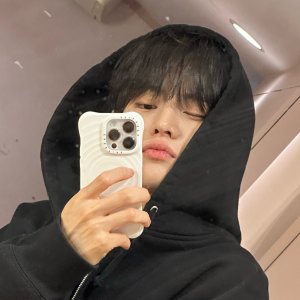the love we think we deserve
Before its release, Love in the Big City faced a lot of pushback and controversy. I admire the production team’s dedication in bringing this story to life despite the challenges.
South Korea, like many places, still harbors prejudice toward LGBTQ+ themes, and BL dramas often face additional scrutiny. But it’s disappointing that this artistic expression, which reflects real experiences for so many in the LGBTQ+ community, would encounter so much resistance. This is the reality for countless people, and I can’t understand why two men sharing a love story on screen is any different from the heterosexual stories we’ve seen for years. Why should it be restricted when it’s simply another story about connection, pain, and growth?
Nam Yoon Su’s performance is a standout and exceeded my expectations. His portrayal was nuanced, layered, and showed a clear dedication to understanding and honoring his character’s experiences. It’s refreshing to see a character like Go Young evolve in multifaceted ways, allowing us to see vulnerability, strength, and a journey to self-understanding that isn’t one-dimensional.
Nam Yoon Su didn’t just bring Go Young to life; he made him feel relatable and genuine, and it’s clear he did his homework preparing for this role.
I’d been keeping Love in the Big City on my watchlist for a while, anticipating what the series would offer. When it was finally released, it delivered the satisfaction I expect from a well-made Korean drama. I’m not someone who often reads the original source material, but judging from feedback and reviews, it seems like the production team really respected the story’s roots. They captured the essence of the characters and crafted a realistic, engaging portrayal that felt true to the lives and relationships it was representing. I’m glad they paid attention to the finer details that make characters feel real, without compromising or simplifying their struggles.
The storyline can be complex and might feel a bit chaotic to those who prefer a straightforward plot. In reality, though, the mixed pacing and emotional highs and lows added a raw authenticity. Love in the Big City is definitely a roller-coaster of emotions, from heartfelt to heart-wrenching, with steamy and even uncomfortable moments mixed in. This range, I think, is part of its charm—it doesn’t sugarcoat relationships or emotions. Each of Go Young’s love interests brings their own traumas and past scars, adding depth to the plot and enhancing the storytelling. Their baggage isn’t there just for drama; it plays a role in their development and helps paint a fuller picture of who they are.
Despite initial expectations that it might lean into a sex-driven narrative, the series proves itself to be far more meaningful. It balances intimacy and substance thoughtfully, presenting a story that is about much more than physical attraction. As someone in the LGBTQ+ community, I found certain elements hit home, especially in how Mi Ae and Go Young’s partners portrayed their relationships and the complexities within them.
There’s a rawness here that resonates, particularly in Go Young’s romantic pursuits, which examine the universal truth that overfamiliarity can slowly erode relationships. His interactions with both Gyu Ho and Nam Gyu show how desire and boredom intertwine, a reality that often mirrors many modern-day relationships.
The chemistry among the actors was undeniable; nothing felt forced or out of place. Even the sensual scenes were handled delicately, with genuine connection in their kisses—a refreshing change from the lackluster, “fake” kisses we’ve seen in the past.
One of the most profound themes Love in the Big City explores is the idea of “the love we think we deserve versus the love others are actually able to give.” We often go through relationships looking for something specific, believing in an ideal form of love. But at the end of the day, real love is about mutual understanding, and we have to learn to accept the love that aligns with who we are. My only disappointment is in Go Young’s character arc; while he found solace and support among friends, I wanted to see a more resolved arc for him—a deeper, more satisfying exploration of self-love and fulfillment beyond friendship. The series does so much right, but leaving Go Young’s development open like that left me wishing for a bit more closure.
South Korea, like many places, still harbors prejudice toward LGBTQ+ themes, and BL dramas often face additional scrutiny. But it’s disappointing that this artistic expression, which reflects real experiences for so many in the LGBTQ+ community, would encounter so much resistance. This is the reality for countless people, and I can’t understand why two men sharing a love story on screen is any different from the heterosexual stories we’ve seen for years. Why should it be restricted when it’s simply another story about connection, pain, and growth?
Nam Yoon Su’s performance is a standout and exceeded my expectations. His portrayal was nuanced, layered, and showed a clear dedication to understanding and honoring his character’s experiences. It’s refreshing to see a character like Go Young evolve in multifaceted ways, allowing us to see vulnerability, strength, and a journey to self-understanding that isn’t one-dimensional.
Nam Yoon Su didn’t just bring Go Young to life; he made him feel relatable and genuine, and it’s clear he did his homework preparing for this role.
I’d been keeping Love in the Big City on my watchlist for a while, anticipating what the series would offer. When it was finally released, it delivered the satisfaction I expect from a well-made Korean drama. I’m not someone who often reads the original source material, but judging from feedback and reviews, it seems like the production team really respected the story’s roots. They captured the essence of the characters and crafted a realistic, engaging portrayal that felt true to the lives and relationships it was representing. I’m glad they paid attention to the finer details that make characters feel real, without compromising or simplifying their struggles.
The storyline can be complex and might feel a bit chaotic to those who prefer a straightforward plot. In reality, though, the mixed pacing and emotional highs and lows added a raw authenticity. Love in the Big City is definitely a roller-coaster of emotions, from heartfelt to heart-wrenching, with steamy and even uncomfortable moments mixed in. This range, I think, is part of its charm—it doesn’t sugarcoat relationships or emotions. Each of Go Young’s love interests brings their own traumas and past scars, adding depth to the plot and enhancing the storytelling. Their baggage isn’t there just for drama; it plays a role in their development and helps paint a fuller picture of who they are.
Despite initial expectations that it might lean into a sex-driven narrative, the series proves itself to be far more meaningful. It balances intimacy and substance thoughtfully, presenting a story that is about much more than physical attraction. As someone in the LGBTQ+ community, I found certain elements hit home, especially in how Mi Ae and Go Young’s partners portrayed their relationships and the complexities within them.
There’s a rawness here that resonates, particularly in Go Young’s romantic pursuits, which examine the universal truth that overfamiliarity can slowly erode relationships. His interactions with both Gyu Ho and Nam Gyu show how desire and boredom intertwine, a reality that often mirrors many modern-day relationships.
The chemistry among the actors was undeniable; nothing felt forced or out of place. Even the sensual scenes were handled delicately, with genuine connection in their kisses—a refreshing change from the lackluster, “fake” kisses we’ve seen in the past.
One of the most profound themes Love in the Big City explores is the idea of “the love we think we deserve versus the love others are actually able to give.” We often go through relationships looking for something specific, believing in an ideal form of love. But at the end of the day, real love is about mutual understanding, and we have to learn to accept the love that aligns with who we are. My only disappointment is in Go Young’s character arc; while he found solace and support among friends, I wanted to see a more resolved arc for him—a deeper, more satisfying exploration of self-love and fulfillment beyond friendship. The series does so much right, but leaving Go Young’s development open like that left me wishing for a bit more closure.
Was this review helpful to you?






